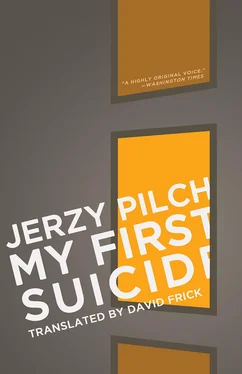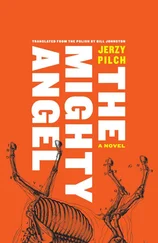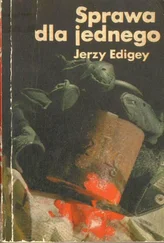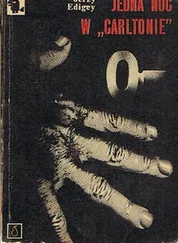“No,” Father responded, “it isn’t the same thing. An air mattress is not a little chess table. The chess board glued to the table top isn’t a coverlet in a brothel. The Congo isn’t Krakow. The entire problem,” Father paled, and drops of sweat broke out on his forehead, “the entire problem stems from the confusion of concepts. The confusion of everything with everything else— that’s the deviltry. The muddling of everything with everything else— that’s demonism. There’s no point discussing it. I won’t give in.”
IV
The tension grew. We awaited Master Sztwiertnia as if for the Second Coming of the Lord, who will judge the advocates and enemies of eccentricity. When, at long last, the drone of his dilapidated Willys resounded in the courtyard, when he himself appeared in the doorway in an ancient collarless shirt, in a worn out brown suit marked here and there with streaks of sawdust; when he sat down at the table in our huge kitchen, and when, after a discussion, or rather, after a cursory review of the structural details of the bookshelves, which were to cover the entire wall, and of the hanging kitchen cabinet; when, self-conscious and the object of the glares of Mother and Grandmother, Father removed from his breast pocket a folded piece of paper with a carefully sketched project for a little chess table — at this point a terrible, explosion-pregnant quiet fell over the kitchen. The master carpenter placed the paper on the table, his silver head inclined ever lower, the women standing at the stove looked at my old man with disgust. It can’t be helped; since he didn’t want to listen to our warnings, since in spite of our admonitions he insisted on committing this prank, now he’ll get what’s coming to him. The master will give him a thorough chewing-out out on the spot and tell him not to bother a serious professional with such caprices. Grandfather sat on the opposite side of the table and smiled cheerfully — for him, every solution was attractive from the narrational point of view. He had said his bit, given his warning — OK, he had a clean conscience, and now, somewhat excited and light of heart, he awaited a hell of a lark.
The master bent ever lower over the page, then he suddenly straightened up and said: “Wait, wait a minute.” And he reached into the side pocket of his jacket and extracted, first, a massive carpenter’s pencil and then — smiling apologetically — an equally massive case holding round glasses in a wire frame, and he put those glasses on his nose and looked at the drawing a good while longer, and he tapped it with his pencil, and it seemed to us all that he was definitively putting a nail in the misguided construction, and he tapped one more time and said: “Wait, wait a minute. One drawer will suffice, but it should be on the side.”
Jesus Christ! Master Sztwiertnia hadn’t put a nail in it, he had only pointed out a flaw in the construction.
Few, very few times in my life have I seen my old man completely happy. Three, perhaps four times. Once, when we were coming down from Partecznik and suddenly, as we came around the bend, our just finished house came into view on the opposing slope in the yellowish radiance of the sun that was setting over Czantoria — perhaps then he was happy. Perhaps he was happy when, a year before he died, he returned home from the hospital, opened the gate, went up the stairs, and life, so it seemed, was before him. Perhaps when, forty years earlier, at the parent-teachers meeting, Mr. Kogutko told him that I was the best mathematician in the class, he was happy, because he didn’t yet know that my career as a mathematical genius would end soon, and hopelessly. Perhaps he was happy when, with superhuman effort in inhuman conditions, he completed work on his greatest invention: a machine that automatically watered balcony flower boxes. Perhaps he was, perhaps he wasn’t. But then, when Master Sztwiertnia treated his project for a little chess table with dignity and curiosity, he was absolutely euphoric.
At first, like a student made self-conscious by unexpected recognition, he didn’t really know what to do. But he quickly overcame his triumphal abashment, and — not favoring either his female antagonists (who were suddenly intently focused on the tea kettle with its sluggishly boiling water) or his ally (which, immediately, judging by his euphoric countenance, Grandfather had become) with even a single glance — he launched upon detailed inquiries with Master Sztwiertnia.
One drawer for the figures and pawns will suffice, but it must be on the side, because that is both convenient, and it maintains the principle of impartiality. Chess is a game in which, before the beginning of the match, the pieces must not be kept on the side of any one of the players. Two drawers, one on each side — OK; but if there is one, then it must be in the middle. Sufficiently deep in order not to unsettle the balance; which is all to the good, since it will be firmly planted. And it won’t be necessary to pull it out the whole way; so that it will be possible to keep something important in its depths. For instance, photographs that you rarely look at or other paraphernalia intended for a man’s use. Sztwiertnia winked knowingly. Panicky hisses began to reach us immediately from the direction of the kitchen stove, but those were already a different sort of indignation. This was ritualistic indignation, and full, for that reason, of a peculiar relief. An indignation that was prepared, practiced, and even studied. An indignation expected by those who were going to feel indignant. An indignation that itself was anticipating its own venting. Not deprived of genuine excitement, but not sensational.
It was universally known that master Sztwiertnia was a rabid sex maniac and would shift every conversation, sentence, and situation in his favorite direction. The fact, however, that the master, in exploiting his uncommon talents, left signs of his obsession everywhere he could — this aroused genuine panic. Sztwiertnia had hands of gold, he could do practically everything, he dabbled in every craft and every art, he played numerous instruments, he also drew and painted magnificently. And it was well known that when you ordered from Sztwiertnia — for instance, a cabinet — it would be a cabinet slightly surpassing in beauty and solidity all the Kalwaria, Gdańsk, and other cabinets of the world; but it was also well known that, somewhere in its nooks and corners, the master — as if it were the author’s signature — would hide a troublesome detail, a lascivious ornament, an obscene bit. And that it wouldn’t be some bare ass with a huge tit tossed off with his carpenter’s pencil. No way! The master would produce perfect mythological scenes, nudes worthy of Titian, Rubenesque shapes; he was realistic like Ingres, sensual like Renoir, perverse like Manet, distinctive — and particularly irremovable — like a Japanese woodcut. No need to add that, following the model of the old masters, Sztwiertnia often gave his nudes faces known to everyone in the neighborhood. The most notorious was the image of a muscular satyr with the head of Pastor Kalinowski embracing a buck-naked nymph, with the face of Ryfka Deresewicz, frozen in a spasm of absolute transport — oil on wood. The wood was the bottom of a huge feast table ordered by the parish for the Church House in commemoration of the founding of our church. The history of the origin of this masterpiece, its concealment, revelation, and destruction — this is a topic for another story.
It was clear what the studied hisses of the women signified and what they concerned. Bad enough that there was to be a little chess table, but now with pornography inside it to boot. But the Master, who adored reactions full of more or less feigned indignation, this time didn’t even twitch.
Читать дальше












